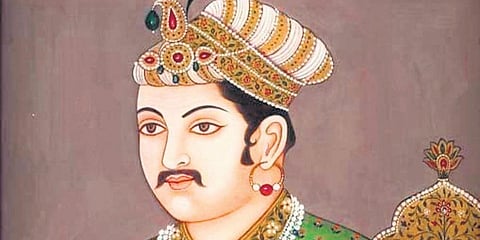

In her biography of the third Mughal Emperor, Akbar, Ira Mukhoty describes the night of October 15, 1542, when at the fort of Umerkot, Humayun’s wife Hamida Banu delivered a baby boy. The good news, when brought to the proud father, set him dancing with joy.
"Humayun then broke a pod of musk and distributed it amongst his amirs, saying: ‘This is all the present I can afford to make you on the birth of my son, whose fame will, I trust, be one day expanded all over the worlds as the perfume of the musk now fills this apartment."
One may interpret these words as either wishful thinking on the part of Humayun, or prescience—but one fact cannot be denied: the baby born that night was to go on to become not just one of India’s greatest rulers, but among the world’s greatest too. Under Akbar, the Mughal Empire reached its zenith, an extent and glory only paralleled by Ashok; and Akbar is still regarded as the epitome of wisdom and broad-mindedness, the originator of the Din-e-Ilahi.
To attempt a biography of a figure as impressive as Akbar is a formidable task, and Mukhoty takes up the challenge with the backing of a good deal of research, drawing on many and varied sources, both Indian and foreign. She begins Akbar: The Great Mughal with a backdrop, describing the origins of the Mughal Empire. How Babur conquered Hindustan and how Humayun found himself hounded out of his realm by Sher Shah Suri, returning to Delhi after many years, only to plummet to his death and have the 13-year-old Akbar be proclaimed Emperor.
The life of Akbar—the personal enmeshed with the political, as it would have been for such a very visible figure anyway—is closely examined over the course of the next 400-odd pages. Along with Akbar’s numerous campaigns as he sought to expand his empire or put down dissent, there are vignettes that showcase many other aspects of his personality: from his fascination with art to his deep interest in military technology, from his personal courage (and his penchant for taming wild elephants), to his loyalty and respect for the Timurid matriarchs who ruled the harem, all come together to paint a composite picture of an intelligent, sometimes wild, curious, sensitive and interesting man.
Akbar’s administrative reforms and the political changes of his empire find their rightful place in the chronology of his reign, and alongside those appear the non-political, non-bureaucratic initiatives of Akbar. Here are chronicled his patronage of the arts and the setting up of a taswir khana that turned out a huge volume of exquisite art. Here too are documented Akbar’s experiments with spirituality, his curiosity about other religions, and his adoption of practices from other faiths.
While Akbar is the focus of this book, Mukhoty also manages to provide an insight into the personalities of some of the other leading courtiers of his era. His two biographers, Abul Fazl and Badauni, are worth mentioning in this respect, as are his foster brother, Mirza Aziz Koka, and the Rajput general Raja Man Singh.
And given Ira Mukhoty’s interest in women and their status (as evinced by her other excellent book, Daughters of the Sun), there is a good deal about women here. Not just royal women like Hamida Banu or Gulbadan (or, even Akbar’s women opponents, Durgavati and Chand Bibi), but women who are rarely named.
The women artists of the taswir khana, for example, and the many nameless women whom Akbar benefited thanks to his progressive laws on inheritance, sati, child marriage, and widow remarriage.Ultimately, however, this is a book about Akbar, and a very good book too. Well researched, comprehensive and beautifully embellished with reproductions of Akbar era art, it is a fine introduction to the greatest Mughal of them all.